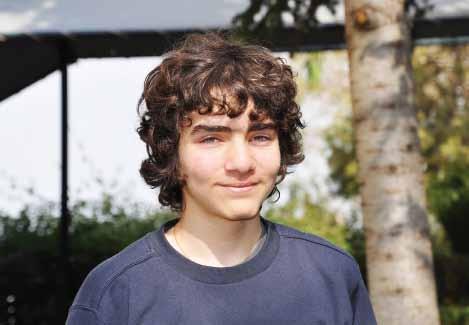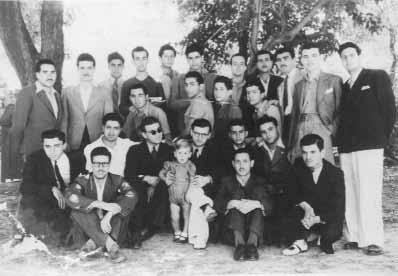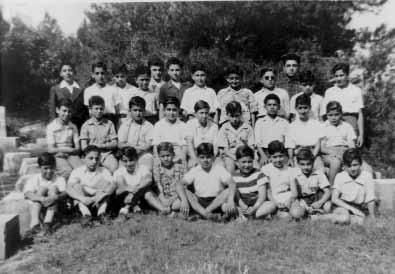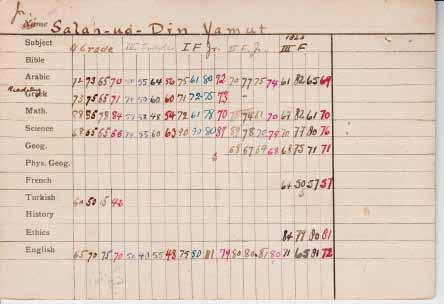
4 minute read
Mehio
Nabil Dabbous ‘80 was already an AUB student when he heard that Mehio – IC and AUB’s unofficial shopkeeper -was about to be ousted from his traditional place just outside the school gate. Dabbous and his friends quickly signed a petition requesting AUB officials to allow Mehio to stay. The students won. An incredulous Mehio arrived home that night and told his family about the day’s event. “He couldn’t believe it,” said Youssef Itani, Mehio’s youngest son. “He was not a talkative man but his eyes said it all.” And yes, it seems IC’s infamous Mehio had a wife and children. Five children actually. All boys: Ibrahim, Mohamed, Marwan, Adnan and Yussef. He also had a name: Mehioddine Ibrahim Itani, born in 1924. He and his family occupied a one room flat in Sanayeh. Mostly uneducated, Mehio had nevertheless a flare for business. How he ended up at IC no one really knows for sure. What is known, however, is that Mehio started out pushing about a modest cart around Ras Beirut selling all kinds of confectionaries. At some point, he made his way down to AUB’s main entrance (back then By the 1960’s Mehio had clearly become an icon of IC. Nothing deterred him from showing up in the early morning hours. it was still a public road) and obviously found a niche for a ready market. That was back in the 1950’s. Mehio was here to stay. He soon expanded his items on his cart and offered students and staff cakes, newspapers and cigarettes (Surgeon General warning didn’t appear until the mid60’s and still meant little then). He never really seemed to run out of cigarettes. Dabbous recalls watching him packing up in the evenings. Mehio would put away all his supplies except for about 20 packs of cigarettes. These he would stuff into his pockets. “Just watch,” he would tell Dabbous. As if on cue, AUB students would suddenly emerge from their dorms and run after him to buy one last cigarette pack. By the 1960’s Mehio had clearly become an icon of IC. Nothing deterred him from showing up in the early morning hours and staying well after classes were finished.
No student was ever refused an item – Mehio simply jotted his/her name down in a little notebook. Neither did he forget a loan as he called each and every student on their IOUs. “His whole business was built up on these loans,” recalled Itani.
In fact, students even flocked to Mehio for personal loans. “Mehio provided soft loans to go watch the latest 007 movie showing at the Edisson cinema nearby and to get popcorn with maybe a Pepsi or a Mirinda,” recalled Kamal abu Haidar ‘79.
Like all others, Abu Haidar’s name was religiously inserted in his little notebook.
The infamous notebooks remained with the family until 2008 when the family home was hit by a small rocket during May conflict in 2008. “These notebooks were heirlooms to us,” said Itani. “I hated to see them burn.” Most students honored their IOU’s. A Libyan student even sent in his money after graduating and returning to his home country. “This is why my father agreed to IOUs because of such people,” said Itani.
Anybody who was anybody could be found at Mehio’s. It was THE place to ‘hang out’. “I remember Mr Chukri Husni, our English philosophy teacher, used to follow us to Mehio after starting his class and discovering our absence, to convince us to leave Mehio alone and come to class,” recalled Dabbous who at times skipped classes and manned the kiosk as Mehio delivered newspapers at AUB.
Mehio never missed a day – not even Sundays. Not during illnesses, not during rainstorms. Not even during the ferocious battles of the 16-year civil war.
At home, Mehio, was a quiet man. He rose at 4am and made his way to the printing presses and bakeries to collect the newspapers and fresh pastries. He rarely showed up at home before nightfall. And then, he was too tired to interact with his family. “It’s true he never had time for us,” said Youssef. “His life consisted of mostly IC and AUB.” But, he added, his boys held no resentment against him. Not only was Mehio responsible for his own five children, he also had to provide for his widowed sister-in-law’s five offsprings. Every night and without fail he would seat himself on the floor, open his notebooks and check the day’s accounts and IOUs. Unfailingly, his eyes would nod and he would lay his head on the cigarette pack next to him. Nevertheless, he provided for 10 children – some of whom made it to university (paid for by Mehio). In 1988, it was business as usual for Mehio when he felt stabbing pains in his back. At the hospital he was diagnosed with cancer and succumbed to the disease in less than a month.
It was the end of an era.
As for Yussef, he finds himself the center of much attention once it is revealed that his father is none other than Mehio. “Major CEOs want to meet me,” he said smiling. “I am very proud to be known as Mehio’s son.” Mehio with his family


In 2010, IC alumnus Omar Sawaf ‘73 started a fund in Mehio’s honor. proceeds from the Mehio Fund will go towards the partnership for excellence Campaign to help build the new elementary school and renovate the campus. a special memorial will be named in Mehio’s honor.
For more information please contact the alumni Office. (alumni@ic.edu.lb; tel: 961 1 367433)










